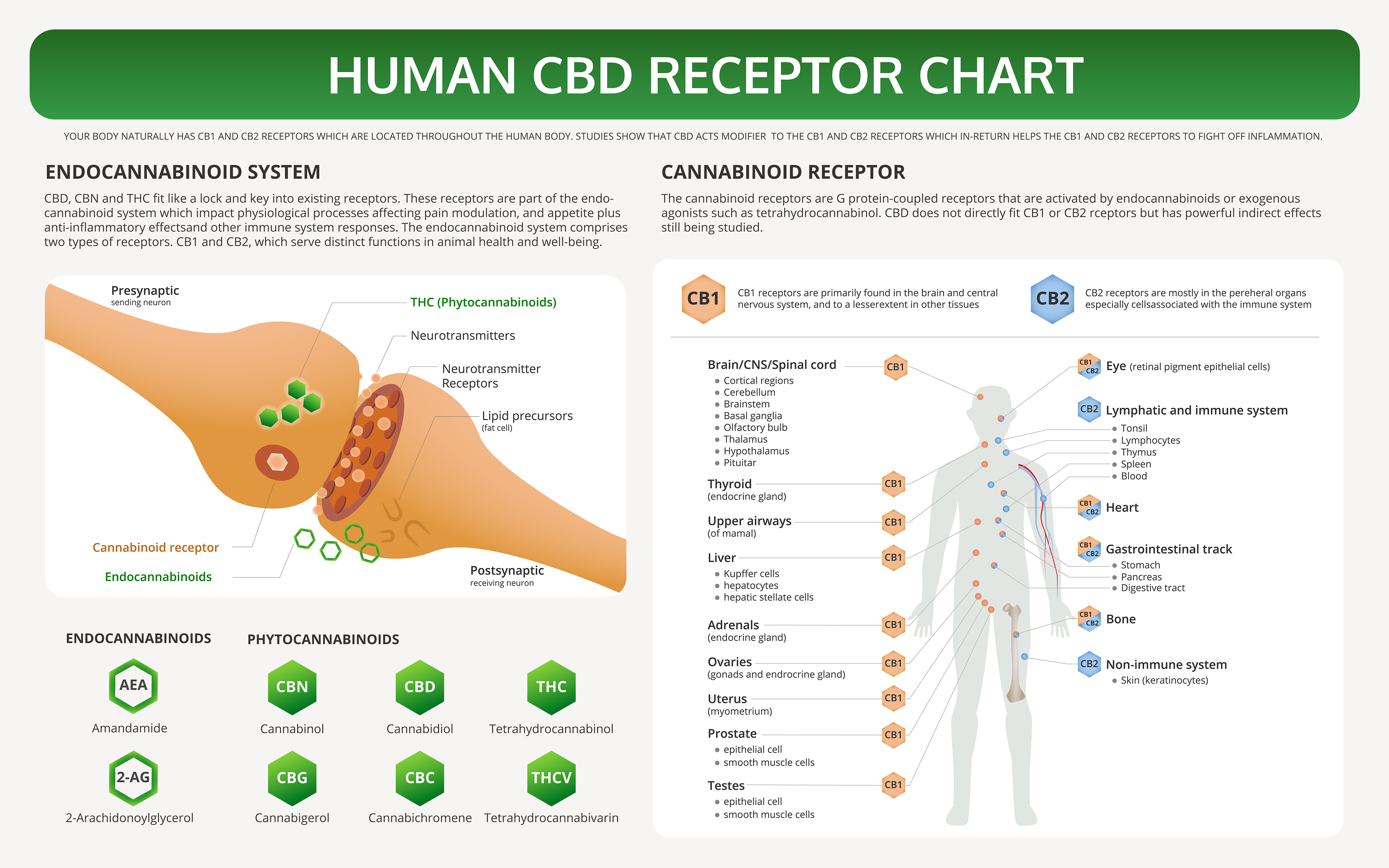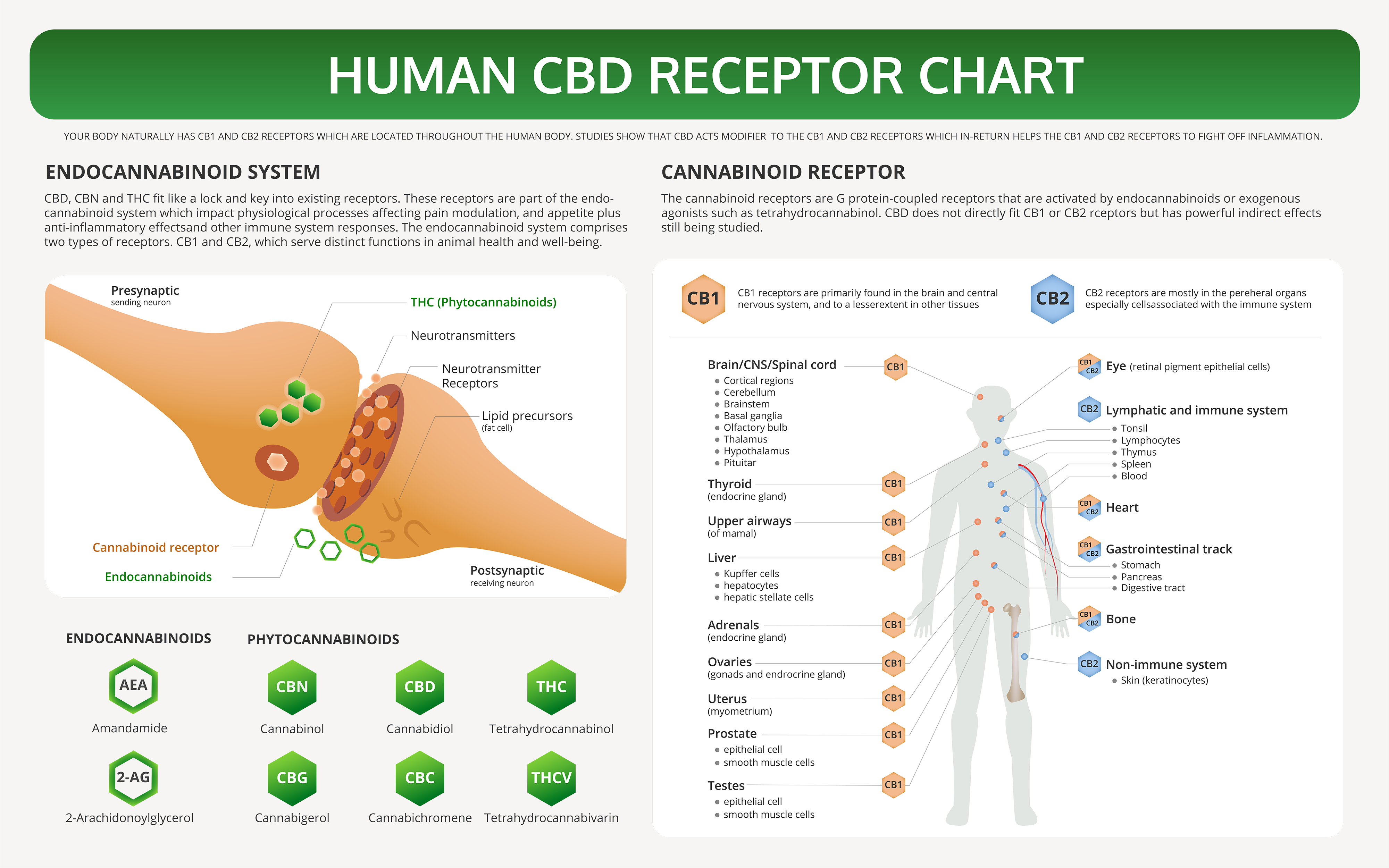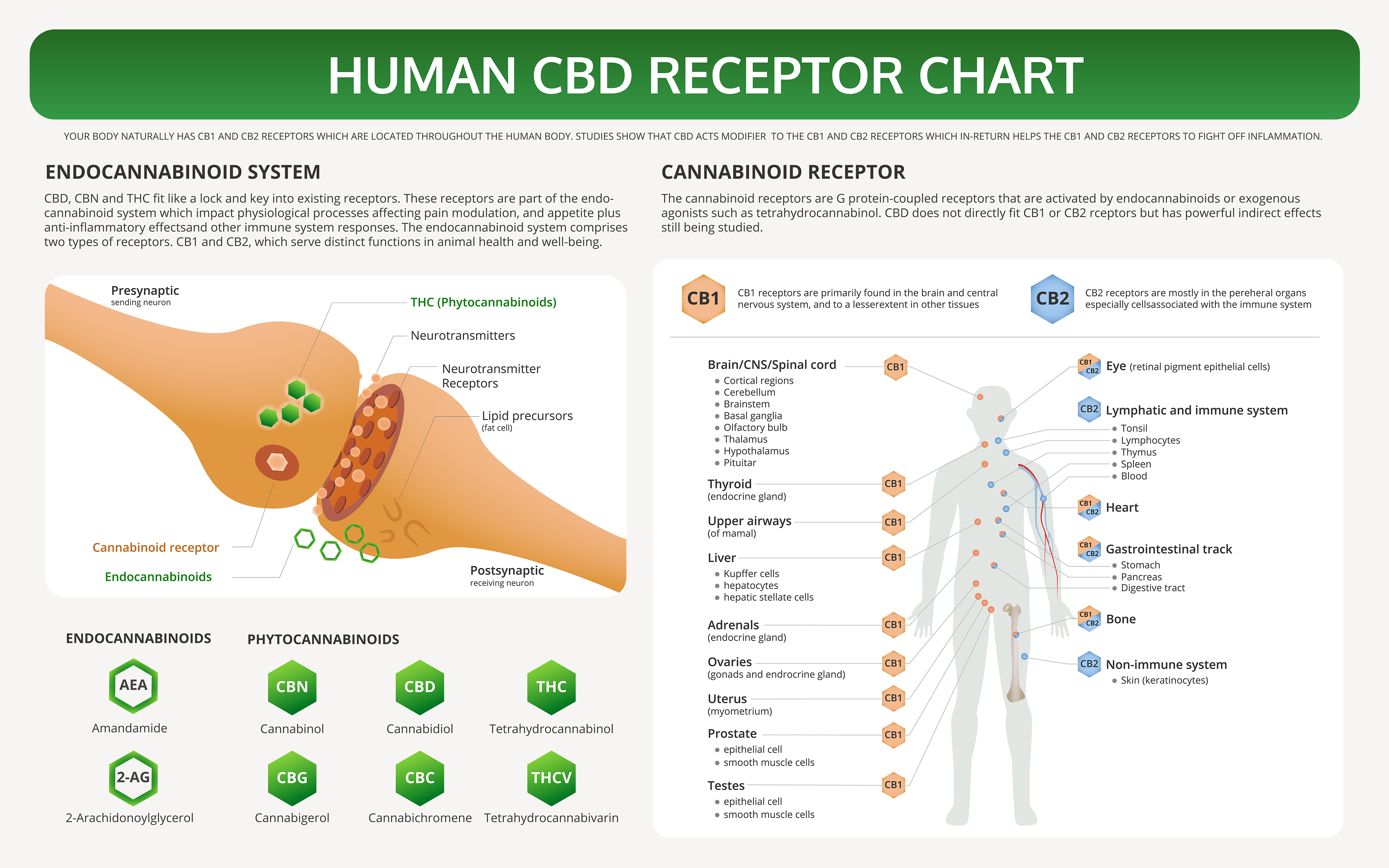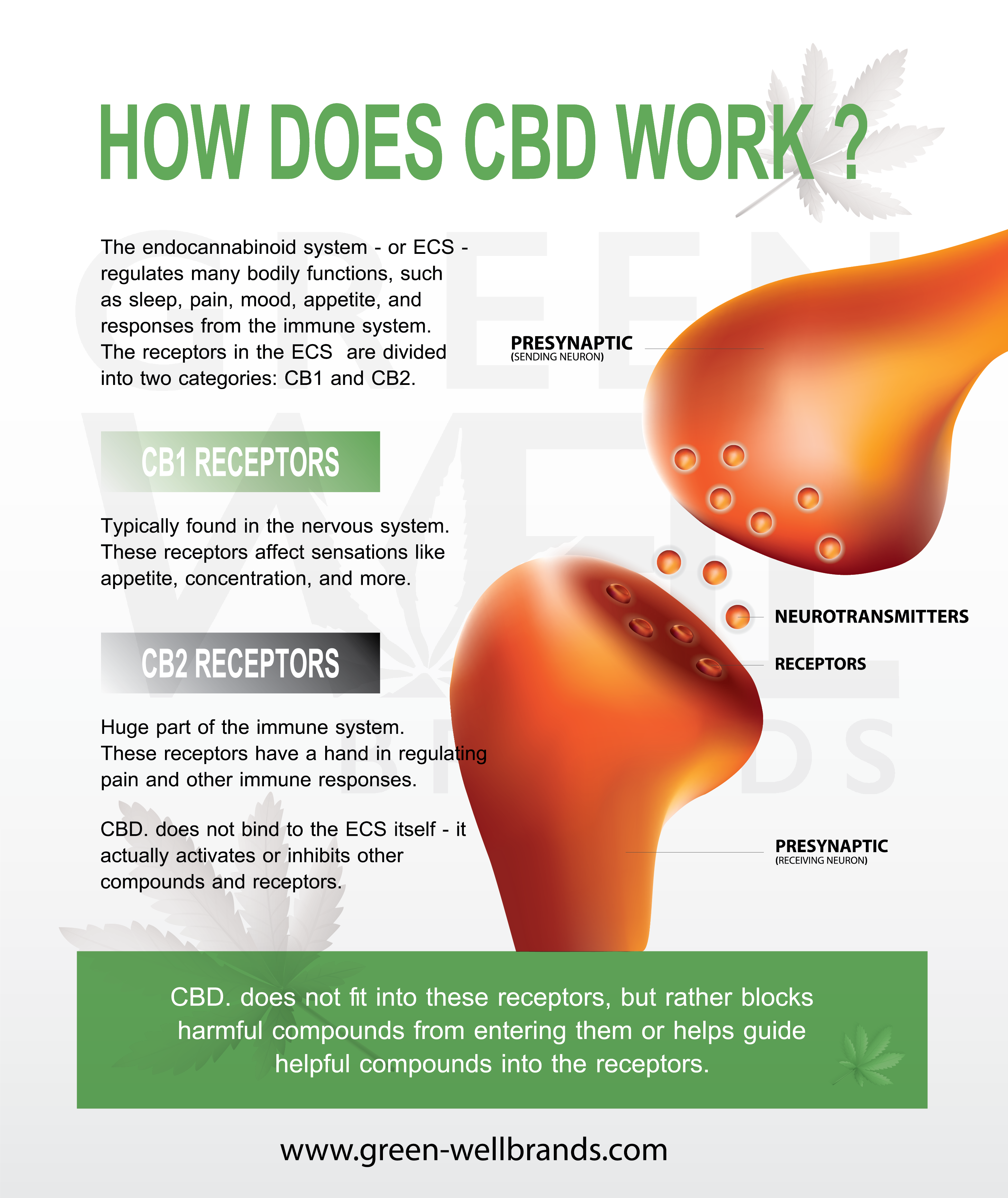How CBD Works in the Body
Posted by Guardian Athletic on Sep 24, 2020

Cannabidiol, also known as CBD, is becoming very popular for its potential benefits as an over the counter dietary supplement. But just what is CBD? How does CBD work in the body? How does CBD work in the brain?
If you’re looking for the answers to these questions (and more), then you've come to the right place. There is a massive amount of CBD for sale online. You (like everyone) probably want to know what you’re getting into before you buy CBD online.
Whаt іѕ CBD? - Cаnnаbіnоіdѕ аnd thе Humаn Bоdу

First things first: what is CBD? This amazing cannabinoid is extracted from hemp and can be used to produce products like topical pain creams to edibles like CBD gummies. Hemp-derived CBD is not the same as marijuana that contains THC. CBD hemp oil must legally contain less than 0.3 percent THC and can not get you high or “stoned.”
While marijuana contains higher levels of THC with lower levels of CBD, hemp contains quite the opposite. Hemp used for CBD has only trace amounts of THC (>0.3%). This amount will not get you high. However, the high amounts of CBD in hemp can have a wide array of benefits. Let's take a look at some of the potential benefits of CBD.
Just some of the potential benefits of CBD hemp oil include (but are not limited to) :
- Chronic pain and inflammation from arthritis and other muscle or joint issues
- Insomnia and other sleep-related issues
- Anxiety, depression, PTSD, and other mood-related issues
- General stress
- Seizures from epilepsy
- Appetite and other digestion related issues
- Acne
- Relief of side effects from cancer drugѕ like chemotherapy (please remember CBD is not a cure for cancer)
- Cardiovascular Health
- Neurological issues like Parkinson's disease, Alzheimer's, and others
- Neuropathic pain
- Multiple sclerosis (MS)
- And more...
That's a large number of potential benefits for an over the counter dietary supplement. It's not hard to understand why the CBD industry is simply blowing up right now - especially since people can feel safe legally buying CBD products. Just make sure that you always check your local legislation and specific laws. Some areas have some minor push back with CBD.
One other thought to remember is to always talk with your doctor before making any major lifestyle change - like supplementing with CBD for whatever the reason. Please see your doctor especially if you have or think you have some illness, injury, or condition. Please don't attempt to diagnose or treat anything at home on your own.
Now that we've covered the basics, let's get into the specifics of just how CBD works in the body and in the brain...
Hоw CBD Wоrkѕ: The Bаѕісѕ

So, now we move on to the question: How does CBD work in the body? Well, you might be surprised to find out that your body has an entire system known as the endocannabinoid system (ECS) - made specifically for interacting with cannabinoids in the environment that you ingest.
Let's get a bit more specific with things. You can ingest and/or use CBD in a few different ways including:
- Sublingual (drops placed under the tongue, held there for a short time, then swallowed)
- Mixed into recipes, drinks, sauces, etc for oral ingestion
- Eaten in pre made CBD edibles like CBD gummies and CBD tea
- Vaping
- Topical use like CBD pain rub, cream, lotion, etc
- Other topical forms like CBD bath bombs
Whether you take CBD sublingually, topically, or ingest , the Cannabidiol will bind to certain cell receptors that know how to utilize this cannabinoid to benefit the body. Once bound, they can essentially moderate the flows and signaling of other chemicals within your body. And the outcomes can be quite beneficial.
When used topically, the same thing occurs with the cells in your body wherever you have applied the CBD cream. Many people love using CBD bath bombs to experience all-over relaxation.
Let's get even more specific now to see just how CBD works in the human body and brain...
How CBD Wоrkѕ In the Bоdу: The Endocannabinoid Sуѕtеm (ECS)
As briefly mentioned above, CBD works in the body by binding to cell receptors within the human ECS (endocannabinoid system).
ECS has many functions in the human body. These include (in no order of importance):
- Mood
- Sleep
- Inflammation
- Immune response
- Appetite
- Brain Function
- Stress
- Pain
Thе ECSis made up of endocannabinoids(naturally occurring cannabinoids inside the body) called anandamides. It is also comprised of cell receptors for cannabinoids, and enzymes that can break these cannabinoids down to be utilized by the body.
ECS receptors can be found all over and throughout the human body. In fact, they are one of the main channels which the body utilizes for sending response signals to environmental stimuli.
There are two main types of receptors with the ECS that react to CBD, specifically. These are:
CB1 Receptors:These receptors are found mostly in the brain and central nervous system (CNS), digestive system, spleen, heart, glands and throughout the entire body. They are known to have significant effects on appetite, mood, and motor activity.
CB2 Receptors: CB2 receptors, on the other hand, are found spread throughout the body, particularly in peripheral immune system tissue and cells.
Both of these receptors are known to be one of the body’s main signaling pathways for:
- Pain perception
- Stress
- Anxiety
- Inflammation
CBD Effесtѕ on Pain аnd Inflammation іn thе Bоdу
CBD is able to indirectly act on these receptors, essentially moderating the signals that they are sending to the brain. This, in effect, can potentially reduce symptoms of many health conditions related to inflammation and pain.
Users have said to found relief from general inflammation and conditions caused by:
- Pain from overexertion(many athletes have started using CBD)
- Acute injuries to muscles and/or joints
- Other inflammation-related conditions like acne
How CBD affects your Brаіn: Sеrоtоnіn and Glіаl Cells
How does CBD work in the brain?Let's now examine how CBD works in the brain. CBD is also believed to work on serotonin uptake, as well as the uptake of other chemicals in the brain. Serotonin is a naturally occurring substance in your body that helps carry signal between nerves cells (for more insights on serotonin check out https://www.verywellmind.com/what-is-serotonin-425327.) This can stimulate serotonin pathways in the brain, affecting mood, helping symptoms оf depression, general stress, even migraines.
Research has also suggested that glial cells in the brain also react with CBD. Glial cells are cells in the brain and responsible for neuronal support. However, if they become overactive for any reason, certain stimuli (like pain or light) can lead to a hypersensitive response. CBD may be able to help regulate these cells and bring them back to a normal level – in essence, relieving the unpleasant response to environmental stimuli like pain.
The Different Wауѕ Thаt CBD affects the Human Bоdу
The information above is some of the most well-know research into how CBD works in the body and in the brain. There are, however, a multitude of studies being done to learn more about how CBD interacts with the human body.
Other medical research has suggested these other potential benefits of CBD for humans:
- CBD may help to reduce THC dependence, as well as dependencies to other substances like nicotine
- CBD may help to lower several kinds of anxiety-related disorders including generalized anxiety, panic disorder, social anxiety disorder, obsessive-compulsive disorder, and even PTSD.
- CBD may help to reduce the progression and onset of symptoms of several neurodegenrative diseases.
- CBD may be useful in dermatology for several skin conditions, including that are inflammation induced.
Cоnсluѕіоn
Hopefully, now you can confidently answer the two questions: How does CBD work in the body? And how does CBD work in the brain? There is much medical potential and promise with CBD. And research is only expanding - providing more potential uses
Please remember to consult your doctor if your are thinking of making any major lifestyle changes - such as supplementing with CBD hemp oil. Put your health first. And please never try to diagnose or treat something at home on your own. Many doctors support healthy dietary supplementation and will help you along the way with your use of CBD products.
Sources
https://www.health.harvard.edu/blog/cannabidiol-cbd-whаt-we-know-and-whаt-we-dont-2018082414476
https://www.ncbi.nlm.nih.gov/pmc/articles/PMC5938896/
https://www.ncbi.nlm.nih.gov/pmc/articles/PMC6222489/
https://www.ncbi.nlm.nih.gov/pmc/articles/PMC6277878/
https://www.sciencedirect.com/science/article/abs/pii/0006295282901952

